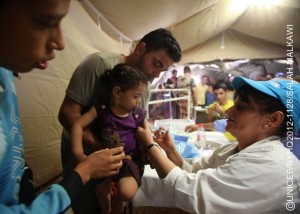救助敍利亚100万名难民儿童
2013-08-23
 敍利亚内战已踏入第3年,今天造成了第100万名难民儿童,标志着事件至今已导致逾百万名敍利亚儿童被迫逃离家园。
敍利亚内战已踏入第3年,今天造成了第100万名难民儿童,标志着事件至今已导致逾百万名敍利亚儿童被迫逃离家园。迄今,敍利亚内战已酿成国内外近500万人受影响,当中188万人沦为难民,逾半数为儿童。最新数字更显示,其中740,000名难民儿童更只有11岁以下。
危机尚未结束
Aya——敍利亚难民儿童的真实故事:
8岁的Aya(左)是个甜美活泼的女孩,两年前一家由敍利亚逃难到黎巴嫩。
来 到一个陌生的国度,他们一家9口住在狭窄的临时帐篷。虽然他们每月均会获发放食物券,但份量却只够维持大半个月的需求。当Aya的哥哥姊姊到菜田工作, 每日仅赚取相当于港币31.2元(4美元)的酬劳帮补家计时,她就要留在家中照顾患有唐氏综合症的11岁姊姊Libaba。Aya教晓姊姊如何洗澡、穿衣 及进食,对她呵护备至,两人也成为彼此的最好朋友。 虽然Aya的哥哥姊姊仍然在学,但Aya却因战乱而失学,父母也再无法负担Aya上学的交通费。所以每当姊姊们放学回家,充满好奇心和求知欲的Aya就会问东问西。Aya希望将来成为一位儿科医生,为家境贫困的孩子治病,不收分文。
UNICEF与当地民间伙伴合作,在儿童友好的中心环境内提供心理辅导、言语及物理治疗,支援儿童及其家人。
Donate NOW to help the children of Syria












